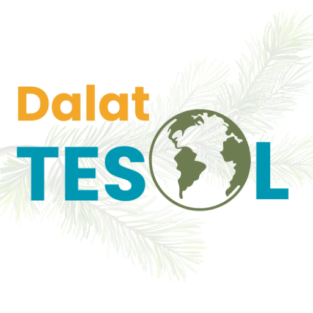By Dalat TESOL
From native speaker norms to global English realities – what interculturality looks like today
🧭 Starting with the Big Question
Walk into any English classroom in Vietnam and ask:
“Who are you learning English to speak with?”
Most likely, the answer won’t be “native speakers.”
It might be Korean business partners, Japanese tourists, Thai classmates, Indian professors, or fellow Vietnamese in international workspaces.
Welcome to the real world of English as a Lingua Franca (ELF) — where English serves as a common language among people who don’t share a native language, and where “correctness” is being redefined by context, clarity, and adaptability.
📖 What Is ELF, Really?
Let’s be clear: ELF is not about broken English or lazy shortcuts.
It’s about how people from different linguistic backgrounds strategically use English to understand each other.
According to Seidlhofer (2011), ELF features include:
- Flexible grammar: “He go there yesterday” might be ungrammatical, but still easily understood.
- Innovative expressions: Vietnamese speakers often say “open the light” instead of “turn on the light” — a literal translation that still works.
- Mutual negotiation: Speakers paraphrase, slow down, or check understanding to keep conversations flowing.
In short, ELF is a social practice, not a test of native-like grammar.
🧠 So What Does Interculturality Mean Here?
When English is used as a lingua franca, culture and communication become dynamic. Instead of applying fixed rules about politeness, clarity, or fluency, speakers constantly:
- Adjust to each other’s needs
- Co-create shared meaning
- Navigate misunderstandings together
Let’s take this real-world example:
A Vietnamese student collaborates with a Thai and an Indonesian classmate on a group project in English.
The Vietnamese student says, “You can send me your file tomorrow morning, maybe 7 or 8.”
The Thai classmate replies, “Morning… you mean… before class? Okay.”
The Indonesian student smiles: “I wake up late — better 9, okay?”
They laugh and settle on 9:30.
There’s no perfect grammar. No native-like pronunciation.
Just real intercultural negotiation, where understanding — not perfection — is the goal.
🏫 The Hidden Curriculum of Native-Speakerism
Yet despite this reality, many English programs — in Vietnam and globally — continue to:
- Hold up native speaker norms as the gold standard
- Teach only American or British pronunciation
- Penalize grammatical variation, even when it doesn’t block communication
This creates what Jennifer Jenkins (2015) calls a “deficit view” — seeing learners as always lacking something compared to native speakers.
In Vietnam, students often say:
“My accent is not good.”
“I want to sound like a native.”
“I speak broken English.”
But is their English truly broken — or simply different, local, and functional?
🌐 English Belongs to Everyone
Let’s imagine two professionals:
- Maria, from Spain, uses English to manage a team across Asia.
- Linh, from Vietnam, gives conference presentations in Singapore, Korea, and Malaysia.
Neither is a native speaker. Yet both use English daily — successfully, strategically, and confidently.
English today is not owned by any one country or accent.
It is a shared, adaptable tool shaped by the billions who use it.
This is the ELF perspective:
English is not about mimicking native norms — it’s about building bridges across cultures.
🧪 Classroom Activity: Listening for Intercultural Strategies
Here’s a practical classroom task.
🎧 Play a recorded conversation between two non-native speakers using English — for example, a Vietnamese and a Japanese student discussing a group task.
Ask students to:
- Identify where speakers clarify, rephrase, or check understanding.
- Note any “errors” that don’t affect communication.
- Reflect: What strategies helped the conversation succeed?
Then discuss:
“Does successful communication always require perfect grammar?
If not, what are we really aiming for in our English classes?”
🎓 Rethinking Teaching: From Accuracy to Adaptability
A shift toward ELF-aware pedagogy means:
- Prioritizing intelligibility over imitation
→ Clear communication matters more than sounding “native.” - Valuing students’ accents and choices
→ Vietnamese English, Thai English, and Korean English are legitimate. - Teaching pragmatics, not just grammar
→ How to clarify, check, adapt, and negotiate across differences. - Building language confidence, not anxiety
→ No more “Sorry for my bad English.”
Example classroom phrases might shift from:
❌ “You said it wrong”
✅ “That’s one way — but let’s try a clearer version”
🇻🇳 Vietnam-Specific Reflections
In Vietnamese universities, many students:
- Learn English from Vietnamese teachers (not native speakers)
- Speak English mostly with other Vietnamese in academic or business settings
- Worry about their pronunciation or grammar sounding “weird”
But in ELF contexts, these local features aren’t failures — they’re part of English’s global diversity.
If your accent is understood, if your ideas are communicated, if your collaboration works — then your English works.
🧭 Self-Reflection for Graduate Students
Think of a time when you spoke English with someone from a different country.
- What helped you succeed?
- Did you adjust your language?
- Were you worried about “mistakes”?
Now ask:
“What would a classroom look like that helped me prepare for that real-world encounter?”
